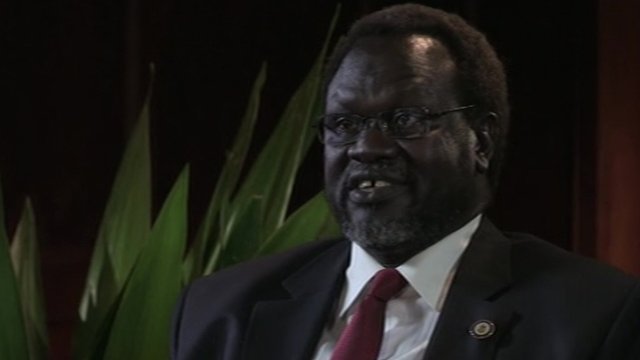South Sudanese rebel leader Riek Machar has told the BBC he is still committed to a peace deal, despite accusing the government of violating a ceasefire.
He said he wanted further “dialogue” with the government, also alleging that President Salva Kiir was not in control of some of the forces fighting for him.
The government earlier accused the rebels of flagrant violations of the truce, but said it would not break it.
The peace deal to end the five-month conflict was signed on Friday.
Thousands of people have been killed and at least 1.5 million have been displaced, according to UN estimates.
Some five million citizens of the world’s newest country are currently believed to be in need of emergency aid, facing mass hunger.
‘Agenda for dialogue’
Mr Machar was speaking to Stephen Sackur on the BBC’s HARDtalk programme and the BBC Arabic Service in the Ethiopian capital Addis Ababa, where the deal was signed.
 Both the government and the rebels accuse each other of launching attacks in Bentiu
Both the government and the rebels accuse each other of launching attacks in Bentiu At least 1.5 million across South Sudan are now displaced, according to the UN
At least 1.5 million across South Sudan are now displaced, according to the UN President Salva Kiir and rebel leader Riek Machar signed the deal in Ethiopia on Friday
President Salva Kiir and rebel leader Riek Machar signed the deal in Ethiopia on Friday“We will negotiate with him [President Kiir]… for the sake of the people of South Sudan, we will negotiate and reach a political settlement”, Mr Machar said.
“Finally, the government accepted the agenda for dialogue which they were refusing before signing the deal. We also accepted this agenda.”
The rebel leader also accused government troops of launching attacks in five locations, including in the town of Bentiu in oil-rich Unity State.
Mr Machar alleged that President Kiir was not in full control of the forces fighting for him, like Ugandan troops and fighters from Darfur, and accused him of inciting ethnic hatred.
Earlier, Sudanese Information Minister Michael Makuei accused the rebels of violating the ceasefire.
But speaking to BBC Africa, Mr Makuei stressed the government “will continue to abide by and respect the agreement”.
“And we call upon the international community to mount pressure on the rebels so that they respect and abide by their commitment.”
There has been no independent verification of either side’s claims of launching attacks.
In Addis Ababa, President Kiir Mr Machar met face-to-face for the first time since hostilities broke out and agreed to halt fighting within 24 hours.
A previous deal, made in January, collapsed in days, with each side accusing the other of breaching terms.
Earlier, the UN called on both sides to facilitate deliveries of emergency aid to a population in danger of mass hunger.
‘Crimes against humanity’
The UN has accused both the South Sudanese government and the rebels of crimes against humanity, including mass killings and gang-rape.
The violence began when President Kiir accused his sacked deputy Mr Machar of plotting a coup.
Mr Machar denied the allegation, but then marshalled a rebel army to fight the government.
The battle assumed ethnic overtones, with Mr Machar relying heavily on fighters from his Nuer ethnic group and Mr Kiir from his Dinka community.
The UN has about 8,500 peacekeepers in South Sudan. However, they have struggled to contain the conflict.
South Sudan gained independence in 2011, breaking away from Sudan after decades of conflict between rebels and the Khartoum government.
 Fighting erupted in the South Sudan capital, Juba, in mid-December. It followed a political power struggle between President Salva Kiir and his ex-deputy Riek Machar. The squabble has taken on an ethnic dimension as politicians’ political bases are often ethnic.
Fighting erupted in the South Sudan capital, Juba, in mid-December. It followed a political power struggle between President Salva Kiir and his ex-deputy Riek Machar. The squabble has taken on an ethnic dimension as politicians’ political bases are often ethnic.

